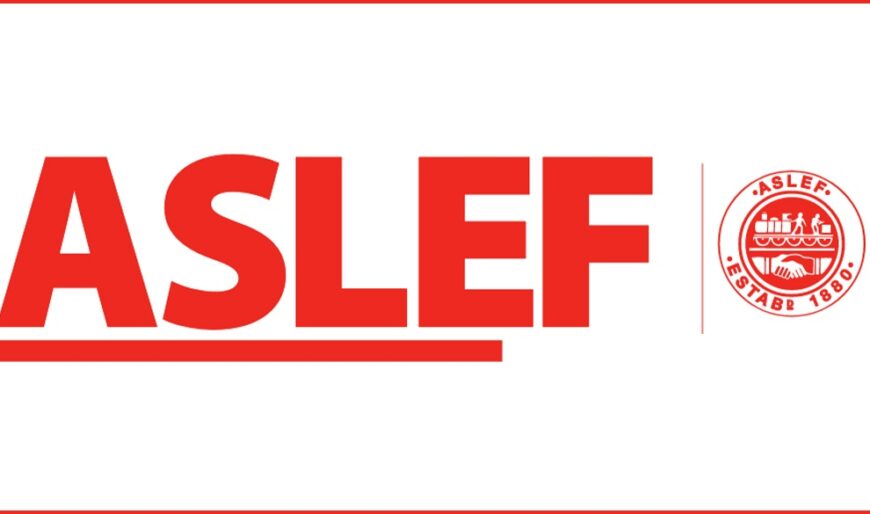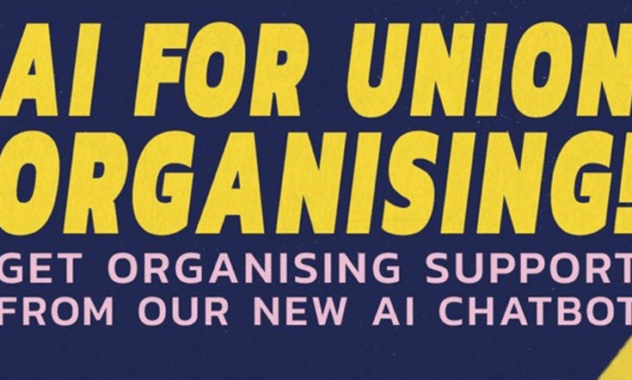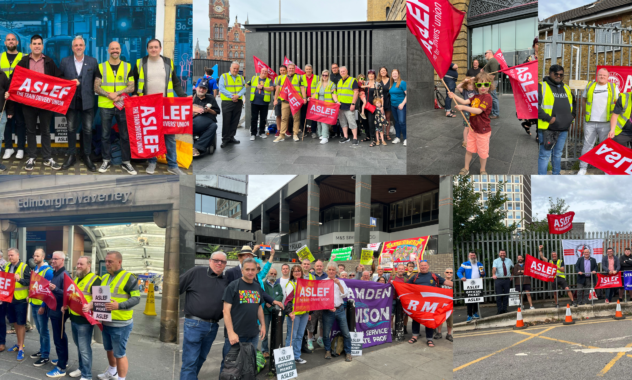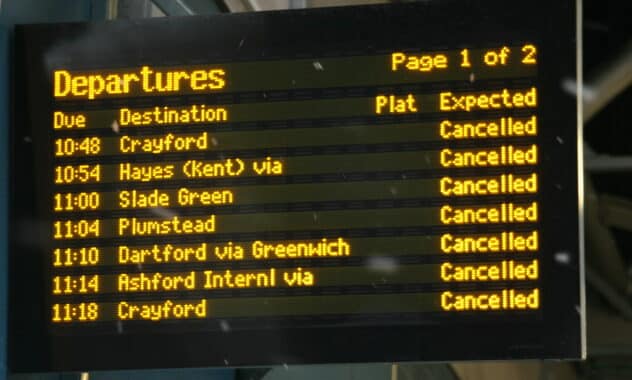ASLEF’s consultation response to hiring agency staff to cover industrial action
ASLEF's response to the Department for Business and Trade's consultation on hiring agency workers to cover strikes.

The Department for Business and Trade brought in the ability for employers to hire agency staff to break strikes in July 2022, however this was put to a stop after being defeated in the high court in July 2023 in a case brought about in ASLEF’s name. The Department for Business and Trade wanted to push on with its plans to break strikes and consulted on removing regulation 7 of the Conduct Regulations which would again allow employers to hire temporary agency workers to cover striking workers.
The consultation ran from 16/11/2023 to 16/01/2024.
Below is ASLEF’s response:
ASLEF Response – Department for Business & Trade – Hiring agency staff to cover industrial action
- The Associated Society of Locomotive Engineers and Firemen (ASLEF) is the UK’s largest train driver’s union representing just under 22,000 members in train operating companies, freight companies as well as London Underground and light rail systems.
- We are opposed to the proposal to repeal regulation 7 of the Conduct of Employment Agencies and Employment Business Regulations 2003 as it is yet another attack on the right to strike and will worsen industrial relations, is not wanted by employment agencies, it risks worsening terms and conditions for low paid workers and is likely to be contrary to international law.
- We also believe that the premise for this decision is deeply flawed as it supposes that the issue is purely one sided and due to the workers democratically voting to take strike action rather than a consequence of the relationship with their employer breaking down. Removing regulation 7 would put more power in the employer’s hands to continue down the path which has led to the breakdown in relations and the resultant strike action rather than pressing upon the employer the need to resolve the dispute.
- We, alongside other unions challenged the original revocation of regulation 7 of the Conduct Regulations which found that the Secretary of State did not comply with their obligation to consult, had not factored in the changes brought about by the Trade Union Act 2016 and that the revocation was counterproductive with the Impact Assessment (IA) only evidencing a minor long term net benefit.
- We are concerned that the Secretary of State seems intent on worsening industrial relations and damaging working conditions for low paid workers with their insistence on revoking regulation 7. We have further concerns that the IA contains some naive assumptions and we hope that the Secretary of State actually pays attention to the evidence base with their second attempt at revoking regulation 7 as we know that employment agencies and trade unions do not think this change will be productive in resolving disputes.
- We welcomed the Welsh Government’s commitment to not use temporary agency workers to cover striking workers as part of the Trade Union (Wales) Act 2017 as that government understands that the best way to resolve industrial disputes is through negotiation, not attack.
- We will set out below that there is a lack of evidence to support the case for revoking regulation 7 and that the Secretary of State would do well to heed the High Court Judgement and focus their time and resources on other matters.
1. Can you provide views and evidence on the effect that regulation 7 has on employment businesses, hirers, and agency workers? If so, please elaborate.
- Regulation 7 functions to ensure that employers can not bring in temporary agency workers to essentially break a strike which would ultimately worsen the industrial relations, leading to further industrial action and even to a worsening of worker pay and conditions.
- Presently the vast majority of temporary agency workers are on assignment at any one time leaving only a small number of agency workers that would actually be available to cover work in the event of a strike, assuming that they had the appropriate skillset and knowledge. Unless the intention is to move to an employment model where a majority of workers are employed in insecure temporary agency arrangements, we do not see regulation 7 currently having much impact on businesses, hirers or agency workers as it is not factored in to their business plans and as evidenced by Neil Carberry, the chief executive for the Recruitment and Employment Confederation, outlining that the announcement of this consultation on revoking Regulation 7 is a disappointment and opposed at scale[1].
- With regards to the railways there are limited roles that could be covered by temporary agency workers due to the highly skilled and safety critical nature of roles. For our members in particular, there is no real prospect of temporary agency workers being appropriately skilled or competent to cover the role, we do however have concerns with any platform or station staff being replaced by temporary agency workers on a strike date due to the implications this could have to the safety of our members and passengers if they are not fully confident or used to the work environment.
- As was noted by the High Court judgement, the previous consultation was carried out before changes were made to how trade unions operate via legislation. Currently the Trade Union Act 2016 sets ballot thresholds that must be met to ensure that industrial action is legal, it also sets the minimum number of days’ notice that a union must give to an employer ahead of strike action. This Act has given employers the ability to plan well in advance of any strike action or to negotiate ahead of the strike date to avert the action. It is not clear how the revocation of regulation 7 is expected to help reach a resolution in any disputes as it would simply sour relations. The revocation of regulation 7 could have the unintended consequence of prolonging disputes and introducing greater disruption by employers using temporary agency workers who are not as productive to cover on a strike date whilst a trade union gives notice for further action due to the use of temporary agency workers causing a negative loop..
- It is also worth noting that the repeal of regulation 7 is another attack on the right to strike following on from the passing of the Strikes (Minimum Service Levels) Act 2023, as there is currently no evidence on how this new Act will impact on strike dates and industrial action it does not seem sensible to be looking to further restrict the ability of unions to utilise, what is their last resort, in strike action to reach a resolution to their disputes.
2. What impact do you think the repeal of regulation 7 would have on workers and the wider economy and society?
- If regulation 7 is revoked it would enable employers to prolong disputes by attempting to replace their striking workers on a strike date with temporary agency workers, any such moves would worsen their relationship with the recognised union, place agency workers in a potentially stressful work environment which could in turn have a detrimental impact to health and safety at work due to the stress of breaking a strike impacting on their and their colleagues ability to carry out their duties safely.
- As the IA itself states “Many successful ballots do not lead to industrial action, often because employers and unions are able to negotiate a solution to the dispute while industrial action is pending.” The IA also outlines that during 2015-2019 when factoring in strike action in public administration, education, health and social care and transport and storage “Close to 40% of these disputes involving industrial action involved just 1 day of strike action, with a further fifth involving two days”. This does lead one to question what impact if any would the revocation of regulation 7 have on these disputes as the temporary agency workers would need to be fully competent to cover the work and it is not clear if there is even a pool of temporary agency workers available and willing to cover the work. As the IA highlights, the majority of unionised workers that would be at risk of being replaced by temporary agency workers on a strike date are lower skilled and likely in the lower half of the wage distribution, as such the revocation of regulation 7 would embolden the employer to drive down terms and conditions further by having the ability to bring in temporary agency workers when relationships break down and strike action is called. This in turn would have a detrimental impact to society at large by pushing more workers into insecure work and lowering wages.
- If regulation 7 is revoked it could lead to further days of disruption as the employer tries to break the strike rather than looking to resolve the dispute through negotiation. The IA naively believes that an employer would not uitlise the ability to bring in temporary agency workers unless it provided a net benefit but there is evidence of employers willing to waste money in an attempt to break a strike instead of negotiating with the trade union/s to settle the dispute as has been evidenced most recently by the government itself in its disputes with ASLEF and the RMT[2]. Whilst a private business may be focused more on a net benefit, the government can wilfully throw away taxpayer money at prolonging disputes in ideologically driven attacks, the IA takes no account for these scenarios, yet references how strikes have been an issue in public services, showing an inability to connect the dots to the common theme.
- There is the potential for industrial action to have a greater impact on the economy with a further breakdowns in industrial relations through the use of strike breaking by temporary agency workers, leading to more strike dates and further use of action short of strike which in turn could have an impact on the wider economy.
- The repeal of regulation 7 has the potential to weaken the ability for unionised workers in lower paid and lower skilled work to successfully organise and collectively bargain for better terms and conditions, this could result in more workers falling into in-work poverty and insecure work having a negative impact on the economy as it reduces their purchasing power.
- It does leave one to question which employers are actually requesting for regulation 7 to be revoked, there is minimal evidence of employers using agency workers to cover striking workers when regulation 7 was revoked in 2022, the IA fails to identify any useful evidence of the use of temporary agency workers to cover striking workers in Ireland or Switzerland as evidenced by the bizarre footnote 27.
3. What are the sectors where repealing regulation 7 would be most applicable and do you think there are sectors it should not apply to? Please give reasons for your views.
- In our view, there is no sector where repealing regulation 7 would be applicable.
4. Do you have any views on the methodology used in the Impact Assessment provided alongside this consultation and does it represent all the likely costs and benefits?
- The IA outlines that the increase in strike action is mostly due to the high rate of inflation causing a cost-of-living crisis leading to pay disputes. The IA also outlines that inflation is anticipated to come down and the IA expects the inflationary pressures causing industrial strife to lessen as the 2% target for inflation is hoped by the IA to be met by early 2025, this in itself should reduce the number of strikes and offer businesses freedom to operate and facilitate economic growth, as is the stated objective of the policy.
- The IA is incredibly light on evidence and it lacks any robust estimate on the impact the repeal would have on businesses to truly state that it would be beneficial. It also relies on assumptions such as employers not attempting to break a strike unless it was net beneficial. It also fails to factor in any reputational damage such an employer would suffer due to their anti-union actions and how this could impact on any ‘net benefit’.
- The IA admits that, to estimate the impact of the repeal, it would need to make several assumptions, for which there is insufficient evidence yet it continues to present a break-even analysis that estimates that the policy would break even over 10 years. We would be seriously concerned if the government was to press ahead with the repeal of regulation 7 on weak assumptions and a lack of appropriate evidence.
5. Do you have any other comments not covered by or evidence not provided in your response to the questions above that we should consider?
- Beyond the lack of need for the repeal of regulation 7 we do believe that the government is not looking at their overall attack on trade unions and how as a whole, the 2016 & 2023 Acts and the proposed repeal of regulation 7 would impact on the UK’s international standing with regards to industrial relations and its duties under Article 11 of the European Convention of Human Rights.
Mick Whelan
ASLEF
General Secretary
77 St John Street
London
EC1M 4NN
[1] https://www.rec.uk.com/our-view/news/press-releases/rec-comments-announcement-regulation-7-consultation-aimed-allowing-agency-staff-replace-striking-workers
[2] https://www.bbc.co.uk/news/business-64317725







